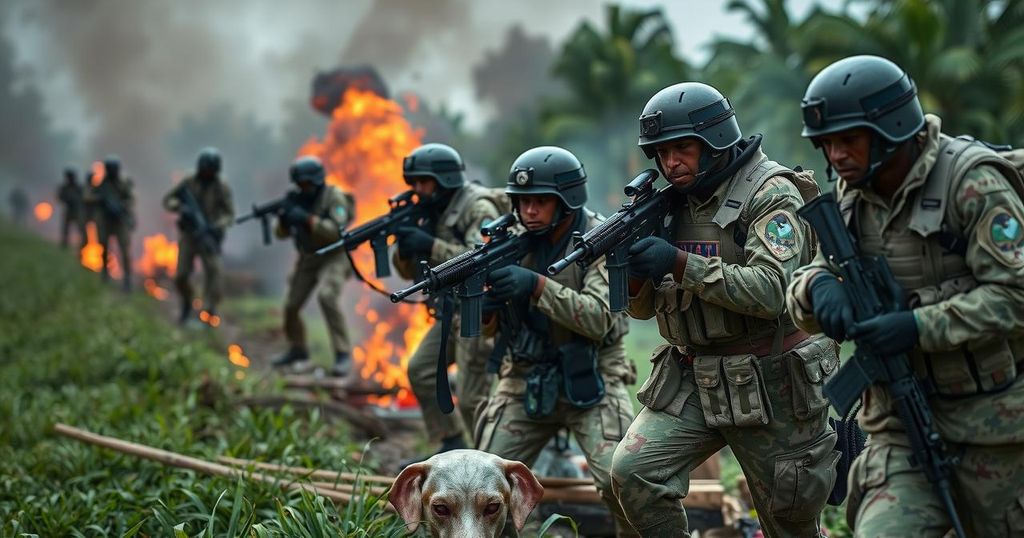Violent clashes have erupted again between pro-government forces and M23 rebels near Sake, DRC, exacerbating a humanitarian crisis as the town transforms from a refuge to a battleground. Despite calls from the EU and the US for the M23 to withdraw and for Rwandan forces to cease support, fierce fighting continues without any territorial gains for either side, leaving displaced civilians vulnerable.
In the Democratic Republic of Congo (DRC), intense violent conflicts continue to erupt between pro-government forces and M23 rebels in the vicinity of Sake town, situated in the North Kivu province. This latest surge in hostilities commenced at approximately 4 a.m. on January 7. Despite initial aggressive maneuvers by M23 rebels, the pro-government forces, bolstered by the Volunteers for the Defence of Fatherland (VDF), resisted their efforts to gain control of Sake. As the fighting persists, both sides have remained entrenched in their respective positions, with local journalist Ismael Matungulu reporting ongoing exchanges of fire and heavy bombardment in the area. Residents, including those displaced, now face heightened uncertainty as Sake transforms from a refuge back into a battleground, with no statements forthcoming from local authorities regarding the escalating conflict.
The strategic town of Sake has historically served as a sanctuary for thousands of displaced individuals but is now under siege from violence that exacerbates an already dire humanitarian crisis. Civilians have reported severe turmoil and confusion owing to the ongoing clashes, notably in Lutobogo and Vunano, where additional fighting has been noted. The situation remains precarious, leading to fears of a possible takeover by M23 rebels, yet no official confirmation has been made. International entities, including the European Union and the United States, have expressed their condemnation of the violence and urged both the M23 and their Rwandan military backers to cease their operations and withdraw.
This conflict not only reflects the complicated interplay of local and regional dynamics in the DRC but also highlights the urgent need for a resolution to prevent further loss of life and to safeguard the humanitarian status of the affected populations. The repercussions of the ongoing battles at Sake extend beyond immediate violence, reiterating the necessity for international attention and intervention to uphold peace and stability in the region. Sake, once a symbol of hope for displaced individuals, now stands as a testament to the ongoing struggle against armed conflict in DRC, drawing the concern of global powers and humanitarian organizations alike.
The Democratic Republic of Congo has been plagued by intermittent violence and armed conflicts that predominantly involve various rebel groups, including M23. Established in 2012, M23 emerged in the context of historical grievances, particularly related to ethnic tensions and competition for resources in the eastern regions of the DRC. The town of Sake, located close to Goma, has been a particular flashpoint due to its strategic importance and significant population of internally displaced persons. As conditions in the region deteriorate, humanitarian organizations increasingly raise alarms about the growing needs of those affected by the conflicts. The involvement of Rwandan forces in support of the M23 has further complicated the situation, raising concerns regarding regional stability and international responses to the crisis.
The ongoing clashes between pro-government forces and M23 rebels in the DRC exemplify the escalating conflict that is once again displacing vulnerable populations and jeopardizing humanitarian needs. As both sides appear to remain steadfast in their positions amidst heavy fighting, the potential for a broader humanitarian crisis looms large. The international community’s condemnation and calls for action underscore the urgency of addressing the conflict effectively to restore peace and security in the region. Without timely intervention, Sake may continue to suffer as a battleground, reversing progress made in the protection and support of displaced individuals.
Original Source: humanglemedia.com






